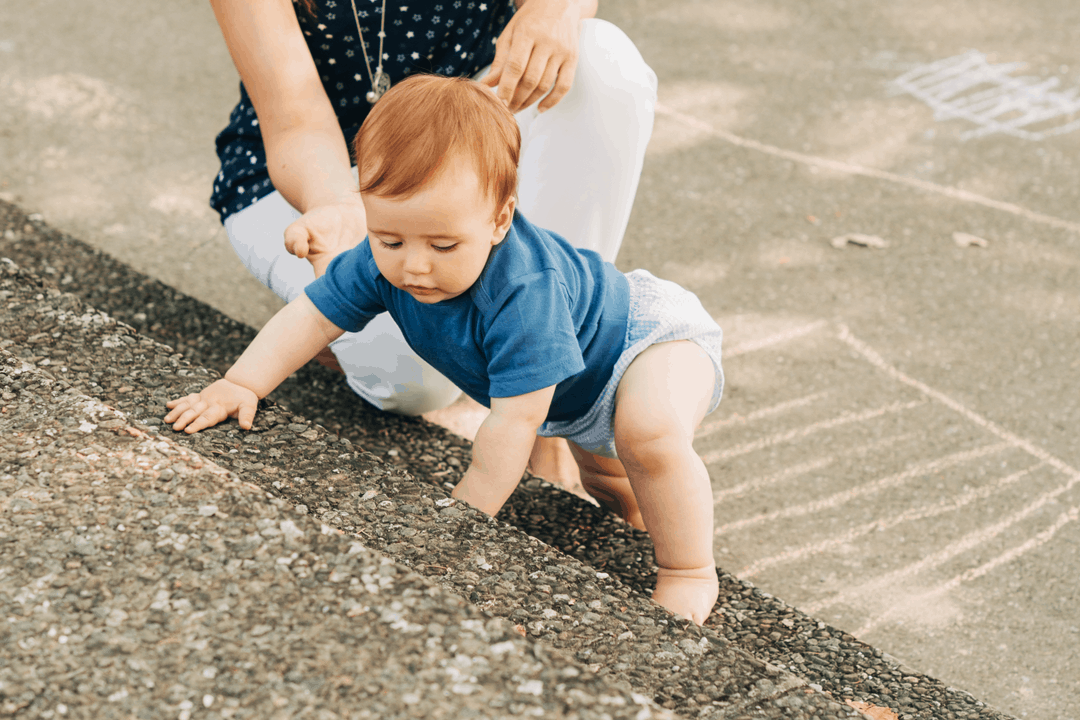Carving out time to create our monthly blog is always refreshing for me. It’s an opportunity to step back from writing curriculum and reflect on something that has impacted me recently. As I look back on this past month, one particular memory bubbles to the forefront of my mind.
A few weeks ago, I found myself nestled in the corner of a restaurant lobby, waiting for a table to become available. As I waited, a toddler caught my attention. This child had spotted a set of wooden stairs they were eager to explore. I watched this toddler climb down each stair with such wonder and curiosity. Every step was a challenge, yet an opportunity to master a new skill. Their parent watched them closely as they rested their hand on this child’s arm, allowing their little one to soak up the wonder of climbing down each stair. Eventually, this toddler reached the bottom, though it took them some time to accomplish their task.
As I soaked in the moment of this parent interacting with their child, my heart began to flood with emotions. Seeing this parent show up for their toddler was just spectacular. This parent could have easily picked up the child and rushed down the stairs or hurried them along, but they didn’t. They chose to let their child take a few extra minutes to achieve reaching each step one at a time. This parent stayed close for support but still let this little one figure out a skill all on their own, and something about that moment overwhelmed my heart.
Over the years, I’ve spent a lot of time pouring through research and recommendations written by early childhood development experts. Through my reading, I’ve found a consistency. Children enter this world as curious, tiny humans.They learn best when we let them explore what interests them.5,6 Flashcards and toys advertised as educational can’t be given credit for creating opportunities for children to learn.1 Instead, it’s loving, nurturing, caring relationships that wire healthy connections in the brain and lead to kids mastering new skills. Learning works best when it’s approached as a natural process that occurs when parents tune into their children, engage in their interests, and provide them with just enough support to accomplish tasks on their own.2,3
Watching the parent coach their child to come down the stairs provided a perfect example of putting this research into action. It also ignited my own curiosity and wonder. As I reflected on this loving parent-child interaction, I began to think about what a different learning experience this child would have had if they fell. Of course, this attentive parent would have most likely caught them from any serious injury, as they did not leave this kiddo’s side during their exploration. However, in addition to growing their gross motor skills, this toddler would have learned, “when I stumble, my parent is there to help me get back up on my feet.”
Learning is a beautiful and messy process, especially for children. Though our world sometimes tells us that an adult’s job is to teach children how to get the right answers, learning is really about mastering skills and concepts as kids go through the learning process.4,5 Helping children learn about colors, counting, and shapes is important, but kids invite us to teach them about these concepts every day. An infant intrigued by the rainbow in a book is a wonderful opportunity to label colors. The preschooler stacking a block tower is an excellent chance to talk with them about shapes and numbers. As you watch moments like these come to life in home visits, remember that as kids lead their learning experiences, it’s okay for them to struggle within reason or get things “wrong.”4 After all, what curious children need the most is nurturing parents. It’s through healthy parent-child interactions that kids learn they’re loved. This sense of love helps children develop the confidence to try new things, take on reasonable challenges, and master new skills. In other words, love leads to learning.2,3
References
1. Golinkoff, R. M., & Hirsh-Pasek, K. (2016). Becoming brilliant: What science tells us about raising successful children. APA Life Tools.
2. Government of the Province of British Columbia. (2019). Toddler’s first steps: A best chance guide to parenting your 6- to 36-month-old. HealthLinkBC. https://www.healthlinkbc.ca/hlbc/files/toddlers-first-steps-english.pdf
3. Parlakian, R., & Lerner, C. (2013). Brain development [Video]. Zero To Three. https://www.zerotothree.org/espanol/brain-development
4. Perry, B. D. (2001). Curiosity: The fuel of development. Scholastic. http://teacher.scholastic.com/professional/bruceperry/curiosity.htm
5. Touch the Future. (2011, May 1). Bev Bos with Michael Mendizza [Video]. YouTube. https://www.youtube.com/watch?v=4_OoFjCruU4
6. Zero To Three. (2010, February 20). Tips on nurturing your child’s curiosity. https://www.zerotothree.org/resources/224-tips-on-nurturing-your-child-s-curiosity

Rachel Cook is a Product Development Specialist. Before joining Great Kids®, she worked as a home visitor with Kentucky HANDS. Rachel lives in Berea, Kentucky, with her husband, where she loves writing and exploring nature.


